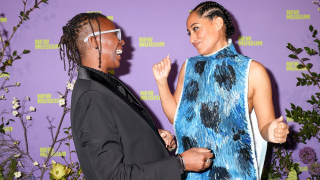Areva Martin is a civil rights attorney, bestselling author, Harvard Law graduate and mother of two daughters attending Columbia Law and Business School.
A recent text exchange with my daughter Michael was jarring.
"Mom, I’m the only Black JD/MBA at Columbia Business School this year!" texted Michael.
"WTF! Black folks gave their lives and made profound sacrifices for your generation to be embraced in traditionally “white spaces?” I texted back in response.
I knew I needed to step back take a breath, and pull together some words of encouragement. At the same time—like Michael—I was reeling from the fact that this is still our reality in 2022.
And over the 48 hours that followed, the problem would only grow more stark.
I posted about the issue on my social media channels, looking for validation, support and advice. My extraordinary community responded by the dozens.
But one response, from a Black father of my generation, caught me up.
“My son graduated Columbia with Masters,” he wrote. “He is now the only African American in MIT’s prestigious Urban Planning PhD program. We simply need more African Americans to make the sacrifice and grind it out…”
Make the sacrifice. Grind it out. Pull up your bootstraps. These are all echoes of the lies that have been exposed time and again when institutions claim that the obstacle to equity is a lack of qualified Black candidates.
Why do people continue to repeat this lie when it has been debunked over and over again by the data—by the numbers of Black graduates who have excelled academically in the face of every obstacle, and by the fact that Black women today are the most educated group in the US?
The lie adds to the oppressive weight of being “the only one” of a particular demographic. My daughters know that being the only Black person in a classroom inevitably leads to the overt and less-obvious stressors as we are seen as the representative of our race. We face questions like, "Why do Black people do this or that?" or "How do Black people feel about this issue?" We hold fears that any mistake we make will reflect on our community as a whole. This pressure, and the anticipation of it, can be unbearable, especially when added to the inevitable microaggressions that come with working or studying in a white world and the isolation of being without peers who have shared some of your lived experiences.
Sure enough, within days of Michael’s realization that she is "the only one" in her program, she was confronted with a video, shown in one of her classes, depicting only white professionals. Instead of being able to focus on the intended lessons of the film, she was forced to grapple with the reminder that Black people like us are an afterthought when it comes to depicting businesspeople, thinkers and leaders. And, she had to sit with the weight of wondering whether to confront her professor about the stark lack of diversity in the film.
This is exactly the kind of experience she anticipated when she sent me that text, and its harsh reality led me to send her and her sister Morgan these words of encouragement:

"Being the only one can be scary. But it also presents unique opportunities to blaze trails, open doors and shatter stereotypes and barriers. Remember that you both come from a long line of folks who never accepted the limitations that society tried to put on them. You have what it takes to exceed the expectations of every person on that campus with your work ethic and talent. Hold your head high, work hard, stay humble and remember every one of your successes is a success for every Black student who is dreaming of getting a JD/MBA at Columbia or any other Ivy League institution. When you walk across the stage in two years with degree in hand—not only will you be a second-generation Juris Doctor and third generation entrepreneur and business owner—but you will be that Black girl that makes it impossible for Columbia to ever, ever have “only one!”
I also have some choice words for her university, and for the too-many-other institutions in the same situation.
As these schools shine in the bastion of liberalism, they should be embarrassed, ashamed and chastened that in 2022, any of one of their classes would have only a single Black person—let alone an entire program. Spare us the excuses and falsehoods. They know what needs to be done in terms of recruitment and supporting a pipeline of future professionals. They need to do better.












